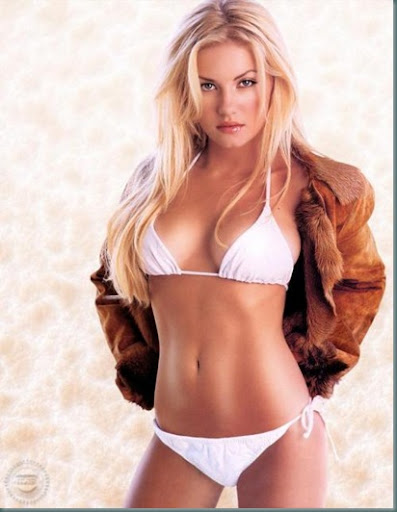It fails as a film musical because it has too much of the worst of both worlds; not enough of the best: It's "stagy" to such a degree it would probably work better on a stage, but does not make enough use of the added intimacy a film camera can bring.
There's also--and I don't often make this accusation--an annoying strain of "political correctness" running throughout. It's annoying first of all because it's tokenistic.
Director Julie Taymor (who is also co-credited for the story with screenwriters Dick Clement and Ian La Frenais) takes the trouble to introduce black, Asian, and lesbian characters. (The last two in one, presumably for economy's sake.) She then leaves them clichéd and underdeveloped.
The love story at the heart of the film, with which we're presumably supposed to identify, is spoilt by the fact that the girl involved (Evan Rachel Wood) is irredeemably stupid. So much so I ended up thinking less of the man (Jim Sturgess) because of the torch he carried for her.
This is mirrored in the film's interracial romantic couple (Dana Fuchs, Martin Luther McCoy) which cheaply invokes the styles and images of Janis Joplin and Jimi Hendrix.
In both pairings, the men sing some of the most beautiful songs ever written for women who, for all the behavior we're shown, don't deserve them.
How does the lesbian couple work out? We don't know. Apparently, it's not important.
She realizes it because, having locked herself in--yes!--a closet, she is urged out by her friends singing "Dear Prudence (which is the character's name)...won't you come out to play?"
Then the young woman finds a girlfriend-who we are told in the one line of dialogue which refers to her is "a contortionist" (kinky!)-and disappears until the final scene.
This is what I mean by tokenistic.
I'm touchy about things like that, as some of you know. But I'm bugged by this not only because of investing so much of my soul in writing my story about a lesbian relationship where the women are not defined only by their sexuality.
But also because, for my money, Carpio gives the best female performance in the film, and I really resented not seeing and hearing more of her-especially in favor of the all-too typical other pairings.
Perhaps more offensively, on the DVD commentary track the director asserts that in the film's Vietnam sequences she did not show the effects of the war on the Vietnamese because she didn't want to exploit their suffering for effect in a commercial film.
This might be a laudable sentiment...if the attempted emotional impact of the entire movie were not built around exploiting the suffering of the working class, women, American soldiers and blacks, etc.
Now...all that said. It'll come as no surprise that the best things in the film are the songs, but the performances and arrangements (which are admirably not slavish re-creations) are also worthy of note.
Sturgess acquits himself best with the Lennon & McCartney compositions, especially the introductory "Girl" and "All My Loving," which he sings to the girl he then promptly throws over for Wood.
McCoy is also outstanding singing and playing Harrison's "While My Guitar Gently Weeps." as well as performing a verse of "Come Together." The latter is otherwise sung as well as you would expect by cameo star Joe Cocker.
The other cameo stars fall resoundingly flat. Bono shows (again) that he should be kept away from any song he actually has to sing. His version of "I Am The Walrus" not only pales in comparision to the original, but to both Oingo Boingo and Jim Carrey(!)'s covers.
Eddie Izzard makes George Burns in the Peter Frampton Pepper sound like the "Sugarthroat" Gracie always said he was.
By contrast, "Let It Be" sung by newcomers Timothy T. Mitchum and Carol Woods, may be the most moving performance of the song I have ever heard, and yes, I'm including the original.
In keeping with this films apparent policy of emphasizing all the wrong things, they are never heard from again.
Getting back to the main cast, as I said, Carpio was my favorite among the girl performers. She only gets one solo, on "I Want To Hold Your Hand," but it's enough to make the hair stand.
As the brother of Wood's character, Joe Anderson gets to sing "Happiness Is A Warm Gun" as a wounded vet in the hospital hallucinating Salma Hayek (both above), and he's great.
As for Wood herself (below), except for a stark "Blackbird,"
All the leads join together for "Because,"
These songs are pretty hard to ruin.
However, one way to do so might be to visualize them with pedantic literalism unbelievably mixed with muddy psychedelic thinking.
For example, I imagine director Taymor saying to her partners in crime:
"Man, what if, like, during "Strawberry Fields Forever," right, we have this character that’s like, an artist, and he's painting...strawberries!" "GENIUS!"
"Or what if, like, in "She's So Heavy," we show a bunch of soldiers...toting the statue of liberty!" "Ooh, what a relevant statement!"
The whole thing is probably best viewed as a series of music videos loosely strung together than anything approaching a real, cohesive story. And would have worked better cut down by at least two-thirds.
Funny, if you'd asked me when I took them home which I thought I would enjoy more, this or At World's End, I would've bet you (if I had any money) it would be this. But there's a simple rule of thumb:
A film that knows it's shallow and has fun with it is almost always going to be better than a movie that thinks it's deep, is very pleased with itself for being so...and is wrong.










No comments:
Post a Comment